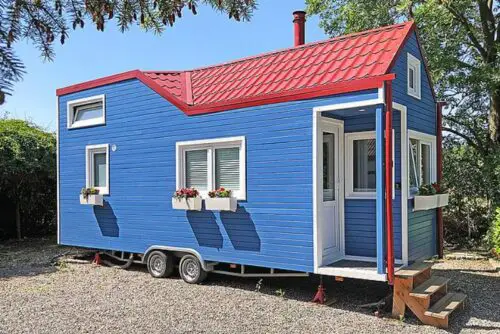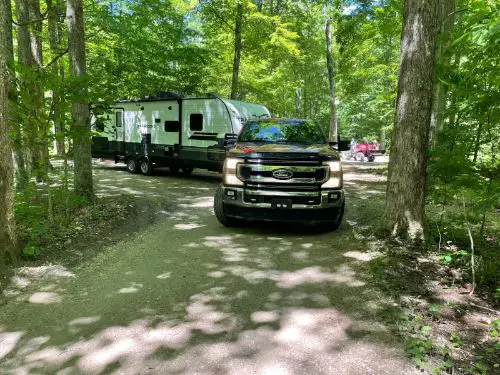You can’t scroll through a social media page without being bombarded by gorgeous landscapes and just as beautiful camper vans. These amazing homes away from home are sometimes done up nicer than my first apartment. Not only are they aesthetically pleasing to look at, but they also serve their purposes well and offer a convenience that other RVs or travel trailers can’t.
But while camper vans have dominated the #vanlife scene, I beg to offer you a different approach: the humble, oft-overlooked truck bed camper.
Now before you write me off and continue searching for your Instagram-worthy Sprinter van, let me give you the rundown on why a truck bed camper may be your next home on wheels.

CAMPER VANS: THE BASICS
First, let’s talk about camper vans. There are endless options when it comes to choosing your van depending on your budget and needs.

Shopping Stuff
If you decide to go with a brand new van build, you can either:
- Buy a van yourself and DIY the helluva it.
- Pay someone to do the conversion into a camper van.
- Or you can buy an already converted model.
Any of these options can be pricey. A brand new Sprinter van starts around $38,000 for the shortest wheelbase and standard roof height while a converted sprinter can cost well over $100,000.
Now before you get too discouraged and think van life is not for you, most van-lifers convert their own vans. In fact, a large percentage of the vans you see when you are actually out exploring are older vans that have been converted by nature lovers throughout the years. If you are looking to convert a van on a budget, know that it is totally doable even for people who have never used a power tool.
Legal Stuff
Camper vans will need to be titled and insured, so make sure you take the time to get your legal paperwork sorted before you go on any trips. If you plan on going full-time or part-time, you’ll need to take care of mail forwarding, choosing a domicile, assigning a primary residence, and other things to keep the IRS happy.
Mechanical Stuff
Another thing you will want to be sure of is that your van is mechanically sound. Spend some time getting to know your van and getting comfortable with tools and how to do basic mechanical work. This will help avoid any problems when you are out on the road.
Now that we have covered some of the basics of camper vans, let’s talk about the pros and the cons of choosing a camper van over a truck bed camper.
PROS OF CAMPER VANS
When you look at the list of pros, it is easy to see why these camper vans dominate the industry. They offer conveniences that are just unbeatable. Whether you are looking for a permanent lifestyle change or just a weekend getaway vehicle, camper vans offer you a great alternative to traditional RVs or camper trailers.

Everything Within Arm’s Reach
- One of the main reasons that people choose a camper van is its simplicity and convenience. Having a small, contained space feels cozy and allows you to keep everything you need in arm’s reach. They are also much easier to drive compared to larger RVs and offer way better gas mileage.
Personalized Outfitting
- There are so many customizable options when it comes to designing and outfitting a camper van. You have options for roof height, number of seats, and even the length. Choosing where to lay out your bed, setting up a kitchen, or putting in a toilet are all tailored to you and your vanlife lifestyle.
100% Self-Contained
- A major pro of the camper van over the truck bed camper is the ability to go from the driver’s seat to the living area without having to step outside. Being able to move easily within the van allows you protection from the elements. What if you pull up to your campsite and it is storming? You won’t want to have to go into the rain to get to your bed.
Easy Parking
- Anyone who has ever pulled a camper trailer or drove a large RV understands how hard it can be to find parking in some places. When you are traveling, many restaurants and stores do not have parking available for larger vehicles, and most drive-thrus have a height limit. The standard height vans can go anywhere a regular vehicle could, creating so many options for parking and food while on the road.
Stealth Camping
- If you can’t make it to a campground or rest area, stealth camping is an option. If your van looks like a regular conversion van, you can get away with parking on city streets or in parking lots that do not allow camping. Stealth camping does come with its own risks, so use discretion and always check your surroundings.
CONS OF THE CAMPER VAN
I know, I know! With the amount of clout these vans have and the hold they have on the digital nomad and vanlife community, it is hard to imagine any negatives to owning a van. However, there are some drawbacks to using a camper van over a truck bed camper.
Difficult to Drive Locally
- Camper vans are one-size-fits-all. Since camper vans are self-contained, you cannot leave your base camp set up and have a second vehicle. A truck bed camper on a hydraulic jack allows for easy removal of the camper, freeing up the truck for local driving.
A Hotel Is Your Only Backup
- If something goes wrong with your van and it needs to be repaired, you are without living accommodation. Since vans are one unit, if something goes wrong mechanically, you will have to find a different place to stay. This actually happened to me when I was traveling in a converted minivan.
Designed for the Pavement
- Even if your van is a 4×4, it won’t be able to handle rough or off roads like a truck could. A van is not the first choice when you are thinking of an off-road vehicle, a truck may be able to take you to more secluded areas and navigate tougher terrain than you could with a van.
TRUCK BED CAMPER: THE BASICS

Truck bed campers are an often overlooked but great option for anyone considering life in a van. These small, but spacious, campers fit in the bed of almost any pickup truck. Trucks allow for more adventurous traveling and help get you off the beaten path. You can trust your 4×4 drivetrain can make it over rough terrain.
Truck bed campers are as unique and customizable as camper vans, but with a different layout. While most truck bed campers would fit two adults and one or two small children comfortably, they are far more compact than an RV or travel trailer. Expect convertible beds and wet baths.
Truck bed campers are also (relatively) cheaper than camper vans. Since a truck bed camper is not designed to be used alone, you also have to factor in the price of a truck. If you do not already own a truck, the price of purchasing both the truck and truck bed camper can add up quickly.
You can find brand new truck bed campers ranging anywhere from $15,000 – $35,000. These campers will have a bed, shower, an option for a cassette toilet, a microwave, a stovetop, fridge, and a dinette. Popular brands include Lance, Northwood Manufacturing, and Northern Lite.
Older and used truck bed campers can be found for much cheaper and may have varying amenities.
PROS OF THE TRUCK BED CAMPER
Since truck bed campers are not as popular or commonly heard of as camper vans, are they not as convenient? Truck bed campers offer a unique experience to their users that is truly unmatched by any other recreational vehicle or trailer on the market today.

Explore the Road Less Traveled By!
- Depending on the truck you choose, you are not limited by rough terrain, bad roads, or beaten paths. Using a truck that is a 4×4 and is designed for a little more off-road action allows for a more adventurous journey.
Park n’ Drive Into Town
- You can remove the truck bed camper at your campsite. If you ever need to disconnect your camper from the truck, you can easily remove it and use the truck and camper separately. Installing hydraulic jacks makes this process as simple as a push of a button.
Easy Registration and Titling
- Most states do not require you to register your truck bed camper. Since the camper becomes part of your vehicle, you do not need separate insurance or registration for it. Check with your local laws and ordinances to be sure, but not having these fees is definitely a plus! You can always purchase additional insurance on your truck bed camper if you feel it is necessary.
Less Maintenance
- Truck bed campers are generally low maintenance. Since they do not have many mechanical things, they generally go years without a maintenance issue. Properly winterizing your sinks and drains can help avoid any leaks or damage to pipes.
CONS OF THE TRUCK BED CAMPER
Now that the truck bed campers have peaked your interest, there are a few downfalls to this convenient alternative. Between their height and weight and poor gas mileage, these may not be the camping option for you.
Heavy Payload
- Truck bed campers can be heavy. This means that they will require a larger truck to handle the payload. If you have a smaller truck, you may have a hard time finding a camper that your truck can carry.
Time-Consuming Removal
- If you do not invest in a camper with hydraulic jacks, manually raising and lowering the camper makes for a hard removal or assembly. Adding hydraulic jacks can be expensive, but in my opinion, a very vital upgrade.
Poor Fuel Economy
- Trucks are already known for their poor gas mileage. Add the weight of the camper and that 15 mpg just went down to like 10.
Bulky Height & Width
- Camper vans are easy to park and allow you to continue to access drive-thru locations with ease. Truck bed campers add a lot of bulky height and width to the truck which can make it hard to find parking or use any drive-thru. Typically, overlanders stick to pop-up truck campers rather than hardshells.
Must Walk Between Camper and Truck
- Perhaps the biggest con, to me at least, is that you have to get out of your vehicle to enter the camper. This can be unsafe in bad weather or if you are camping alone. It also makes it impossible to make a quick getaway if something were to happen.
IN SUMMARY
Choosing between a camper van or a truck bed camper depends mostly on your lifestyle, needs, and wants. Some people love the convenience of a camper van and do not mind the possibility of being out of a living space if the van needs work. Others would prefer the flexibility of the truck bed camper. They like to remove the camper and continue to explore in their vehicle while knowing that their campsite is set up and ready to go.

No matter which way you go, you will find your own pros and cons to your home away from home as vanlife is a quirky lifestyle for sure. The best advice is to try out both options before making a large financial decision. This will allow you to see what works for you and what doesn’t so you can take first hand experiences and turn them into your dream vehicle.
Do not get caught up in the #vanlife look. A 1999 Chevy express takes you to the same locations as a 2022 Mercedes sprinter – or a 2017 Silverado with a truck bed camper!
Sara Sabharwal is a modern digital nomad exploring the world one road trip at a time. She splits her time between North America and India and has yet to find a place that she didn’t fall in love with. Her favorite destinations include dark sky parks and forested mountain ranges. My dream is to live in a van down by the river, which I luckily get to do 3-6 months out of the year.
-
Sara Sabharwalhttps://changingears.com/author/sara-sabharwal/
-
Sara Sabharwalhttps://changingears.com/author/sara-sabharwal/
-
Sara Sabharwalhttps://changingears.com/author/sara-sabharwal/
-
Sara Sabharwalhttps://changingears.com/author/sara-sabharwal/










